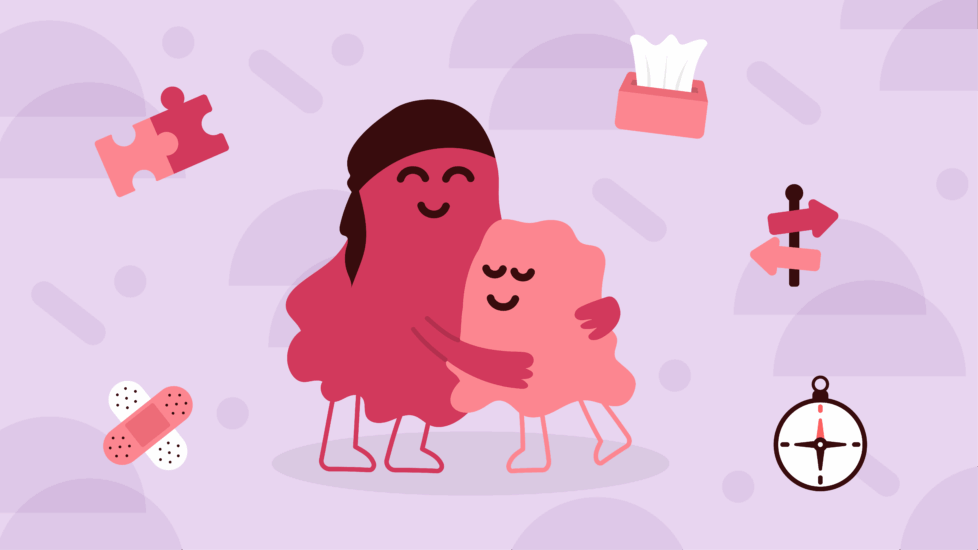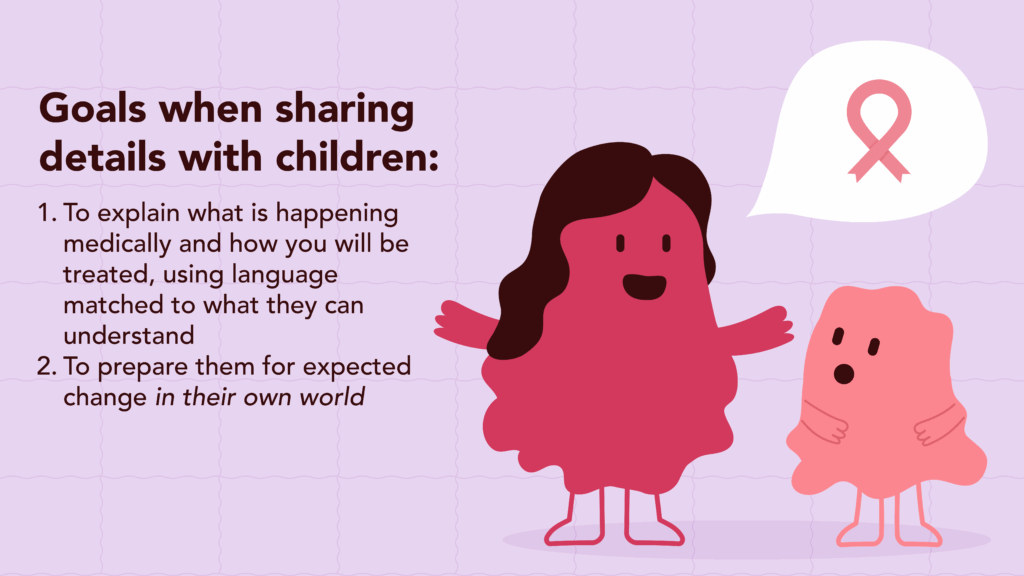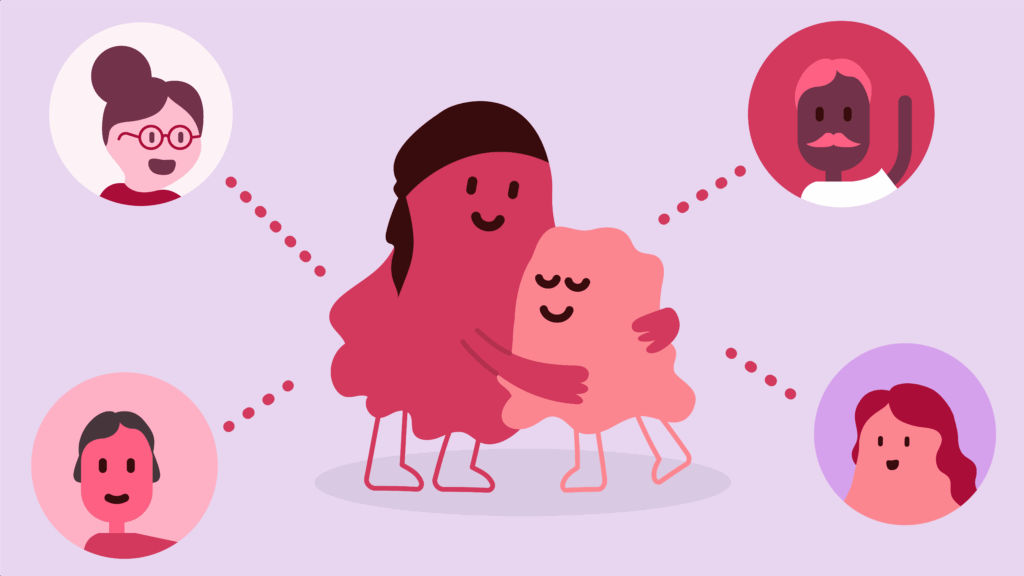


Additional free resources for families facing cancer can be found at nbcf.org/parents. Click here to download a printer-friendly version of this blog post.
If you are a parent with cancer, you are not alone. One in 5 newly diagnosed cancer patients have children 18 years old or younger, and almost 3 million kids in the United States have a parent with cancer, or who had cancer. Because a child’s functioning is closely tied to the well-being of their parent, it’s important to validate a child’s experience with their parent’s cancer and offer healthy ways to help them cope with their emotions.
After sharing the news of your cancer diagnosis with your family, you might be wondering what you can do to support your children as you go through treatment. We often think of kids as resilient, but it’s improbable to think that a cancer diagnosis in the family won’t change or impact them. During this time, kids need care, compassion, and reassurance after learning of your cancer diagnosis to help them cope and navigate through this new situation.
When children are faced with a difficult situation, such as a parent being diagnosed with cancer, they will naturally try to understand what they see and find ways to cope with changes in their life caused by the illness. While you can’t control the situation, you can control how supported your child feels. These efforts may even help you cope as an entire family.
Here are 10 ways you can help your kids cope with your diagnosis, including tips on what to say and where to go when you need additional help. These suggestions can be used in conversations with your children, stepchildren, or any other important kids in your life.
Jump to:
Parents may be tempted to hide or downplay their cancer diagnosis to their children in order to protect them. But when kids don’t have all the information, their imaginations, friends, or even the internet can start to fill in the gaps, creating scary scenarios that may be worse than what is actually happening. Therefore, it’s important to be honest with your kids when you are facing cancer.
You can be honest about your diagnosis and treatment plan while still using simple language and practicing open, honest, and developmentally appropriate communication methods. While you don’t want to sugarcoat the experience, you can also try to avoid overwhelming kids with too many details or medical jargon. When sharing details with children, tell them enough—not everything.

You can start by asking your kids what they know about cancer, affirming correct information, and clarifying any misconceptions. You can also explain what your treatment will consist of, including potential side effects, so they aren’t surprised by what’s to come.
Below are some examples of common questions kids ask, along with example statements for how to answer them. The level of detail and the words you use will depend on the age of your child. Generally speaking, the younger the child, the fewer details they will need.
Cancer happens when something goes wrong with a part of the body called cells. Those cells don’t work right and grow too fast, making it hard for some of the healthy parts of the body to work right.
No one knows for sure what causes cancer, but doctors do have different ways to treat it and they’re going to take good care of me.
Absolutely not. Nothing you ever did, said, or thought could possibly cause my cancer. Sometimes it just happens and there’s no explanation. This is nobody’s fault. I’m so lucky that you love me so much.
No, you can’t. Cancer is not contagious like a cold or the flu. You can’t catch cancer from me or from anyone else who has cancer. I will always be honest with you and protect you.
My doctors are treating me with strong medicine so that I will be like millions of people who get better after cancer. Some people do die from cancer. Right now my doctors are treating me with strong medicine to get rid of the cancer so that I can get better. I will tell you if my situation ever changes.
Cancer treatment can dramatically affect your appearance as well as your overall mood and energy levels. Before you begin treatment, share potential side effects with your kids, such as hair loss, fatigue, or nausea, to help them anticipate when things start to change.
When possible, use real words that your child may overhear in conversations, such as cancer, chemotherapy, radiation, surgery, scans, etc. The repetition of these words can help provide some security to your child as they begin to recognize and process what is going on in your life.
Below are some potential phrases you could use as you begin to prepare your children for expected changes that come with cancer treatment:
Your children may tell you that they are okay with their words, but their actions might show otherwise. Every child is different and they all express their feelings in different ways. Some children may become avoidant or experience tantrums or meltdowns. Or some may show very little outward emotion. These things alone do not necessarily mean your child needs intervention or outside help; it could just be the way they process their feelings.
In order to validate these new feelings and emotions, the following phrases may be helpful:
However, there may be situations where your child needs more support. Be on the lookout for any of these potential signs that your child may need help coping with their complex emotions in this difficult time:
If you see any concerning changes, here are some things you can say or ask:
Every kid is different, which means their emotional expression will also vary. Some kids might be more reflective and want to talk or journal, some may be more creative and want to use art or music, and some may be more active or physical, using sports or big movements.
Talking can be helpful, but it’s not comfortable for everyone. The key is to remain patient and consistent, meeting your children where they’re at and making space for their individual coping styles.
When talking with your children, be patient. Some kids want to talk about your cancer diagnosis immediately while others need time to process their emotions before sharing anything with anyone. Keep looking for openings for them to express emotions. Every child is different and there is no one-size-fits-all approach.
Here are some things you can say to encourage your kids to share how they are feeling with you:
Since it can sometimes be hard for children to put words to what they’re feeling, offering books on related topics may help kids open up in these conversations. See Recommended Books for Families Facing Cancer for a list of expert-recommended books on topics ranging from understanding cancer to grief and trauma.

Even if your kids are small, their feelings and emotions are big and real. They might be feeling a mix of sadness, anger, worry, and confusion. It is important to listen to them without judgment and to take their feelings seriously. Open lines of communication between you and your children serve as the foundation for helping them.
Encourage your kids to express what they are feeling, rather than holding it inside, and let them know you will always be a willing listener and take their feelings seriously. You may need to remind them regularly.
Below are a few phrases you can use in conversation with your kids to let them know that you are there for them and that you care:
Cancer can spike stress, agitation, and worry for you and your family. That’s why teaching children stress management techniques and practicing them together can help everyone.
Fortunately, there are simple ways to help manage some of the stress that comes with a diagnosis. Taking a walk, having a cup of tea with a friend, listening to music, practicing mindfulness and meditation, or even being playful can help. The key is to make stress relief part of your and your children’s everyday routine.
When left unchecked, stress can lead to physical symptoms in the body, such as stomachaches and headaches, a weakened immune system, trouble sleeping, and more, for both you and your children, according to the American Psychological Association.
To help your kids—and yourself—manage stress, encourage them to:
After a cancer diagnosis, you might feel like everything has changed in an instant. From experiencing major emotions to a busy treatment schedule and the side effects that accompany it, there is a lot to manage and process.
At the same time, it is important to try to maintain routines as much as possible for your kids. Studies show that consistent family routines, such as eating dinner together as a family, playing games together regularly, and even reading, storytelling, or singing together, can provide a 47% increase in kids’ social-emotional health.
Sticking to existing discipline patterns, rules, and expectations can also help kids by maintaining predictability when other routines may be changing.
Simply put, kids thrive on consistency.
Realistically and understandably, not every routine will be able to stay in place. However, keeping up with some regular family rituals, when you’re able to, can have a positive impact on your kids.
Replacing one activity with a similar one can also help maintain a feeling of consistency. For example, if you can’t sit down for regular meals due to treatment side effects, watching your favorite TV shows together may foster the same sense of unity. If you can’t attend every soccer game, ask someone to take videos and pictures so you can still be part of the action.
Your village can help you maintain routines, even if you can’t be present every single time.

This is the time to say “yes, thank you, that would really help” to friends, family, and neighbors who offer assistance. Your village can support you and your family during cancer treatment so you can fulfill your two most important jobs: taking care of yourself and ensuring your children’s needs are met.
Specific ways your friends and family can provide help and support for your kids might include:
Some kids will need more help than you can give, especially during your cancer treatment. Likewise, some children appreciate the support and perspective of a more neutral party.
If your kids are exhibiting constant sadness, withdrawal or isolation, an inability to be comforted, difficulty with sleeping or favorite activities, or acting notably different than usual, it might be time to seek out additional help.
Here are examples of how to encourage children to accept support from others:

Cancer isn’t something to fix. Rather, it’s a situation to support. The physical and emotional challenges of cancer can test the limits of even the most resilient parents and can unsettle even the most mature, secure children. This is when professionals dedicated to helping kids thrive can be helpful.
When you take care of your own emotional needs, you are automatically helping your children. Make sure you have the professional help you need—from your medical and care team as well as from therapists, family counselors, clergy, or school counselors who can offer help and support to you and your family as you process your cancer diagnosis. Letting your children’s teachers and school counselors know what’s going on is also a good idea so they can pay careful attention to your kids’ needs.
Helping your kids deal with their big and real emotions following your cancer diagnosis, while coping with your own new normal, can seem like a daunting task. But by answering their questions, providing some details, and keeping the lines of communication open, you can provide your children with the compassion and validation they need. Your efforts to get better and to guide and support them are powerful ways to say, “I love you.”
NBCF is here for parents facing cancer; you are not alone in this journey. For more free resources to help guide children through a parent’s cancer diagnosis, read:
In addition to NBCF, there are other groups dedicated to the emotional well-being of children and families who have a parent facing cancer. Below are a few organizations to consider partnering with on this journey.
American Academy of Children & Adolescent Psychiatry, 2019
American Cancer Society
American Psychological Association
National Cancer Institute
UCSF Medical Center
National Breast Cancer Foundation is here for you—and your family—as you navigate a breast cancer diagnosis. Visit our website to learn about NBCF breast cancer support groups, obtain free educational resources, or find a patient navigator in your area.
Donations are always appreciated, but there are lots of great ways to get involved.